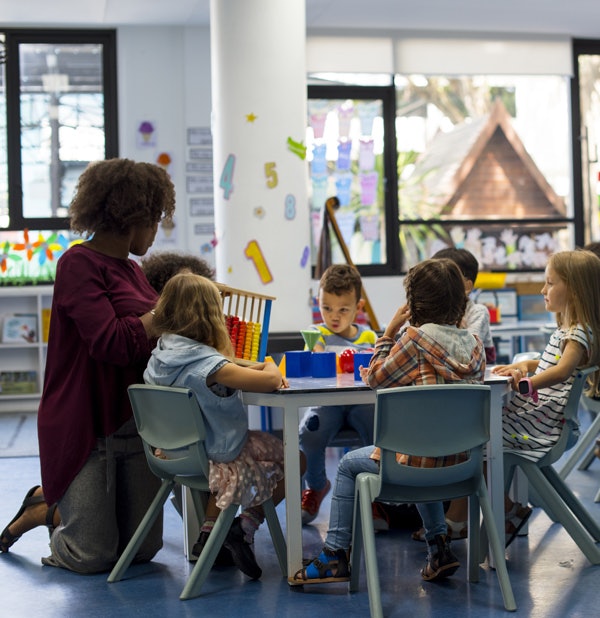Keri Rodrigues, cofounder of the National Parents Union, passionately discusses public education and testing from the perspective of a parent.
Keri Rodrigues is a parent activist in Massachusetts who co-founded the National Parents Union, which unites parents in disrupting traditional education policy discussions to better reflect the needs of families. A labor organizer and Democrats for Education Reform advisory board member, Rodrigues worked with the late Senator Edward Kennedy on education issues to stop systemic injustice from being passed from one generation to another.
The former foster child describes assessing all students as helping to eliminate inequity as long as we focus on action, not just numbers. Her remarks came during a conversation with Anne Wicks, the Ann Kimball Johnson Director of the Education Reform Initiative at the George W. Bush Institute, and William McKenzie, senior editorial advisor at the Bush Institute.
Why did you, as a parent, get involved in the politics of public education?
I had no idea that politics had anything to do with education. I was a mom of three little boys, I was a union organizer. I had a child who had some special needs and was going to need some help. I know how to advocate; I do this for a living. I thought that my kid would be fine because I could fight for whatever he needs.
It wasn’t until I was sitting at the end of an Individualized Education Program (IEP) table when my son was in kindergarten, and he had been suspended 36 times. He had a first-year temporary kindergarten teacher who was overwhelmed with too many kids in the classroom, and she hadn’t even had time to read my child’s IEP. I’m sitting at this meeting surrounded by a team of educators who had already given up on my six-year-old son.
They told me there was nothing they could do for him. It was an indictment of me, and they were clearly aggravated with him. The balance of power was just off, and so I started asking questions. At the time, I was the chair of the Somerville Democrats, I was on the democratic state committee doing all this work, and I didn’t have any power.
I thought there must be someone who’s organized. This can’t be the end of the line. But there was nobody. Things started to click for me, and I saw that parents really had no power.
What do you think parents need to know as their children return to school this fall amid the pandemic?
Parents know more about our children, how they learn, and what they’re capable of than ever before.
Our national polling tells us by a 2:1 margin that parents are not interested in shoving their kids back into the traditional systemic box. We have seen that doesn’t work, and parents now have questions.
The first question in our polling is about health and safety. Parents are concerned not so much about academics but about social interaction and being able to trust that schools can actually keep our kids safe from a deadly virus. In so many urban schools, the buildings are crumbling, there are rat infestations, and there is no soap to wash your hands.
This was real before COVID-19, so the idea that parents can now trust these systems to provide adequate disinfection is hard for non-White families to wrap our heads around. Our national polling with thousands of parents across the country tells us that they do not trust that this will be okay.
What are your thoughts about how valid, comparable, and quality testing can be a tool for parents? What do you wish parents better understood about tests?
The problem is, especially for parents of children of color, why generational institutional racism was allowed to perpetuate for a century. It is very easy to dismiss a parent and reduce their experience to an anecdote if there is not data to back up what parents are seeing first hand.
Some educators love to do that. You walk into a school, and the school is painted beautifully. It’s got rainbows and butterflies, and the teachers are smiling, and it looks like such a lovely place — and no one is learning to read. That is not a good school.
I want my kids to be joyful learners. They cannot eat joy if they cannot get a job after 12 years of education. They’re not going to have a joyful life. That is not the future we want for them.
I want my kids to be joyful learners. They cannot eat joy if they cannot get a job after 12 years of education. They’re not going to have a joyful life. That is not the future we want for them.
If I don’t have testing data to make sure my child’s on the right track, I’m not able to intervene and say there is a problem and my child needs more. And the community can’t say this school is doing well, this teacher needs help to improve, or this system needs new leadership.
As a community, we cannot do that based on feeling. We have to have facts, and the only way we have these facts is by testing our children, assessing them, getting them what they need, getting the teachers what they need, and getting the system what it needs to improve. We owe that to our kids.
Students take classroom tests, district tests, and state tests. What would you say to parents about the range of exams their children take, and how they might be able to use that information to advocate for their students?
It’s really important to have a statewide test because of the income disparity that exists in our society. Black and Brown excellence is real, but just because a kid lives in Dorchester does not make his or her life is less valuable than a child that lives in Wellesley. And it is unfair to say that just by luck of birth that a child born in Wellesley is somehow entitled to a higher-quality education.
We are here to fight for equity in education, and making sure the quality of education that a child living in an inner-city receives is the same as the child living in an upper-middle class district. That’s not too much to ask, because that’s the difference between equity and equality.
Equity is about making sure kids that may not be resource wealthy are still provided with equitable access to opportunity to have the same education. It’s our job, as the grown-ups running the system, to ensure that equity.
What advice would you give teachers about how to inform and empower their parents and engage them as partners on behalf of the students?
I’m not one to quote George W. Bush often. He’s not really my go-to guy. But his line about the soft bigotry of low expectations was right on point. The belief gap is real.
Just because my children are beautiful, Brown little boys does not mean that they are not capable of proficiency or excellence. We don’t need White saviorism. We don’t need folks who feel badly or think our kids are not capable simply by virtue of their zip code or the color of their skin. All of our kids are capable of excellence.
So, number one is overcoming your own bias. We don’t do enough work with teachers right now. That’s why so many of us are fighting to ensure we have more diverse educators in the classroom because our children need mirrors and windows.
We have a White-dominated profession and probably will for some time. We must make sure that the educator pool is diverse. By being a person of color, you do have a leg up on the belief gap. You know that children who are Black and Brown are capable of excellence because you were one of those children.
We also need White educators to dig in and overcome internalized bias. That is a real thing.
Educators do us no favors when they are not honest and frank about the talents and deficits our children are facing. I know my child is wonderful, he’s a joy, he’s funny, and he’s tremendous. I need to know if he’s reading at grade level. I need to know actionable items that I can do as a parent that will help you in the classroom, and what I can be doing to support that.
I need you to admit what you don’t know, and understand that there is a reason why parents have a hard time engaging. Many of us are survivors of our own public education experience, and there has been no restorative justice.
No one has ever apologized to me for being a 15-year-old girl who was in foster care, going through a very traumatic situation with my family, being identified as gifted and talented, and being expelled from a public school, which was my only safe place. There has been no restorative justice with me.
So, when I go into having to fight for my kids, I go in with my dukes up. I consider myself a survivor of public education. I want more for my kids than just surviving the experience. I want them to thrive and grow and have access to opportunity.
What are you hearing from parents about how they may be using testing data to advocate for their students? Or, conversely, where you think there are big gaps between parents and teachers, and how we can overcome those gaps?
Oh, there are huge gaps. During the spring semester, parents were willing to extend a lot of grace to teachers, to schools, to systems. There was a lot of, “Oh, you know, we’re all doing the best we can.” Even if some of us didn’t hear from teachers for five weeks, we were willing to say learning online was tricky.
But when we got deeper into the pandemic, and teachers were still giggling about not knowing how to use Google Classroom and Zoom or report cards did not extend our students the same amount of grace since students were trying to figure things out too, that is when we started hearing from parents around the country that things were not fair.
Parents are now trying to redirect the conversation. They want to make sure buildings are safe and that online learning delivers for students. They want to make sure schools are figuring out remote education. And parents want to see a re-imagining of education.
We are seeing parents say they have not had these options before. They are going to hold schools, educators, and systems accountable. The grace period has ended.
How do we demystify the process that surrounds standardized testing? A lot of times parents will say, “I don’t know what’s in there, I don’t know what my classroom teacher is doing, and I don’t know what these standardized tests do.”
My son Matthew is a rising seventh grader. When he was in third grade, the morning before the state’s MCAS test, I was doing my due diligence. I wanted to make sure he got a good breakfast and I had not mentioned the MCAS to him. But when I did, his shoulders hit his ears and he had a physical reaction to me simply saying the word “MCAS.”
How does that happen? Who put in his mind that he should be so stressed and upset that someone was going to give him a test to see what he knows? That’s trauma. Who has authorized an educator to do that to my child?
As a parent, I was furious. How dare you do that to my child? I didn’t sign up for that. That is the indoctrination that we are doing to our children in classrooms and it’s not right.
This is a strategy to vilify the test. It is the same as making my kids terrified of thermometers. It’s very clear what is happening here and, frankly, it’s infuriating as a parent. We have to stop this.
Testing is a tool for us to hold the system accountable to make sure our kids have what they need. It allows us as parents to call out that it is not right what are you doing to our kids, that I didn’t say it was okay to do this to my child. That’s abusive, in my estimation.
Testing is a tool for us to hold the system accountable to make sure our kids have what they need. It allows us as parents to call out that it is not right what are you doing to our kids, that I didn’t say it was okay to do this to my child.
In education reform circles, we love to bring a book report to a knife fight. We want to have nuanced conversations about our facts and figures. But we have to speak very plainly, and ask educators what are you doing right now? If we don’t speak plainly and effectively, they will get away with this.
That may be my favorite education quote ever, “Don’t bring a book report to a knife fight.” I’m going to make that a bumper sticker.
If teachers are doing a good job and teaching the things that our kids need to know, they have nothing to fear from a test. Even if you’re not, and you need some help, then we can know what you need help with.
We’re not doing our kids any favor by letting ineffective teachers remain in the classroom and not correcting it. That is not helping anyone. I don’t understand the benefit of that.
Is there anything that we haven’t asked you about testing and the role it plays in creating agency for parents that you wanted to share?
One thing that is frustrating is that we’re good at testing and assessment but making that data actionable so that we actually change things is a horse of a different color. We collect data, but making the needed changes is a deficit. That’s a frustrating problem.
Here in Boston, it is very difficult to watch generation after generation of children be recycled through an underperforming urban district that makes no advances unless it’s under federal court order to do so. We’re not seeing aggressive enough intervention to take this data from spreadsheets to change things for kids.
Every minute that we waste, more children fall through the cracks. These are not just numbers on a spreadsheet. They are actual children’s lives. We lose these kids to poverty, incarceration, and death.
We need to act with more urgency when we see these numbers and the house is on fire. Don’t come to me with the watering can. I want the whole damn fire department.
We need to act with more urgency when we see these numbers and the house is on fire. Don’t come to me with the watering can. I want the whole damn fire department.
When you see things that are actionable, take action now. Start to intervene, do so with more urgency, and understand that there are children’s lives at stake.




























